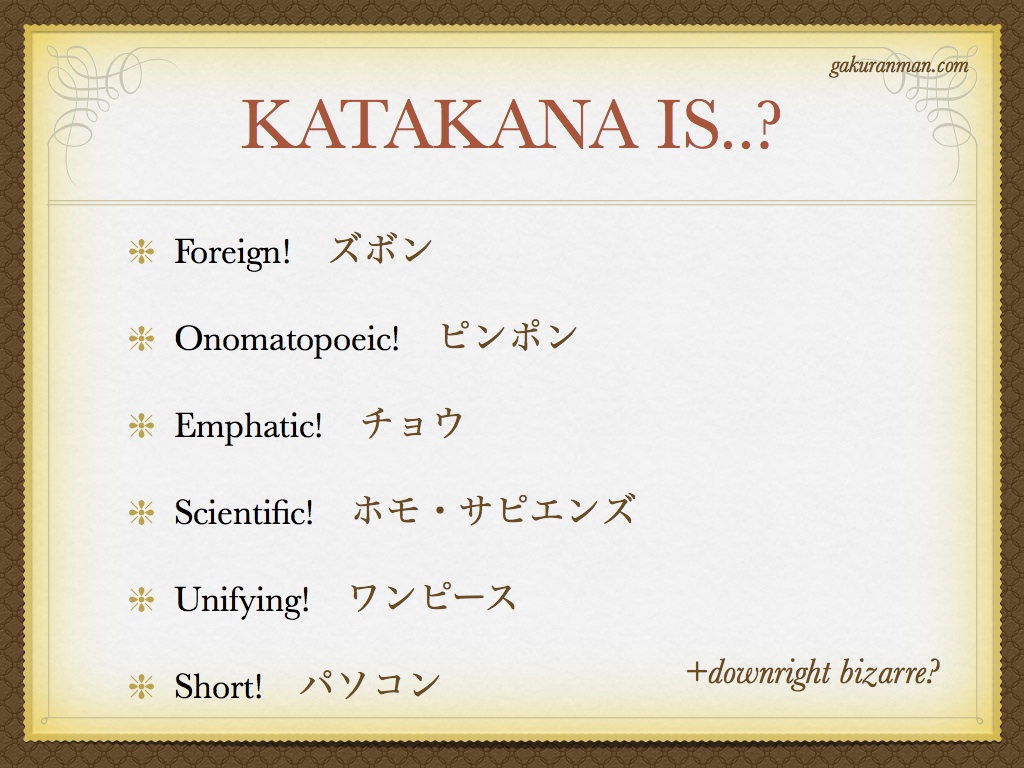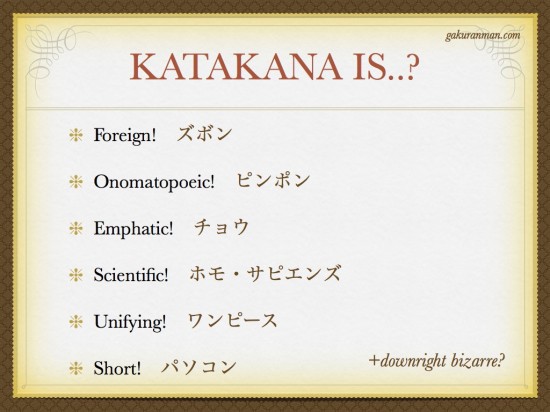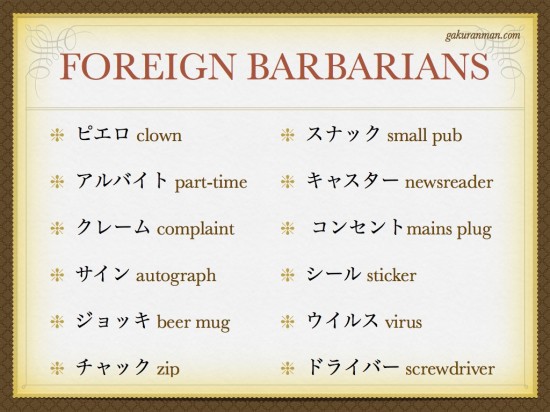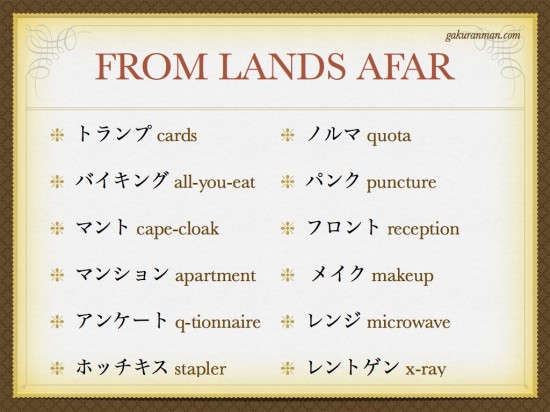The Japanese language has a smattering of quirky expressions. At first glance, their meanings can often elude us. This is especially so with Katakana words, as they often contain elements from foreign languages, as well as mixtures of slang and even current, trending terms.
Some of you may remember these from a past collaboration post between Tofugu and Gakuranman. It doesn’t hurt to revise, and there was such a wealth of good material that I couldn’t let it slip through the nets. We’ll be looking to expand on this series in the future as well, so revisiting ‘Strange Katakana Words’ now will set us up well for that!
Firstly then, what uses can Katakana have? We touched on them in this post introducing the Japanese alphabets, but didn’t go into detail. Let’s take a look below.
We’ll be looking at all of these uses across the next few lessons, with the one exception of Okurigana that I’ll briefly explain now. Katakana is sometimes used in old, historical documents in place of where we would use Hiragana today. Things such as particles and suffixes, as well as for Furigana to show the reading of difficult Kanji compounds. It is also used in Okurigana – the parts of words that inflect the verb (to show what tense it is in, or its aspect, such as ‘short’ or ‘not short’). For most people though, you needn’t worry about using Katakana for these purposes – just know that it does exist.
Okay then, let’s go. First up —
Foreign Loan Words
By and large, Katakana is used for writing words of a foreign origin. Often they have been lifted directly from the language (which isn’t always English) and Japanised. This can lead to extremely confusing expressions that both native English speakers and native Japanese speakers fail to understand at first glance. Once you start seeing a bunch of Katakana words like this, you’ll start feeling a new affinity for all those Kanji you have to learn. Being able to see a character and understand its fundamental meaning is incredibly useful!
ピエロ
Clown, from the French ‘pierrot’.
アルバイト
Part time work, from the German ‘arbeit’. This word is used a lot in Japan, especially among young people. It can be shortened to just バイト.
クレーム
A claim or complaint about something. Note the similar word クレーマー (claimer). This sort of person likes to make complaints about things, often arguing to the point of becoming obtuse and loud. They will rarely accept any explanation that doesn’t meet their request.
サイン
A signature or autograph. It can be both the celebrity kind and boring, personal kind you’ll need to fill out tax forms and sign for packages.
ジョッキ
A beer-mug, most likely derived from the English word ‘jug’.
チャック
A zip. The word was most likely coined from the second part of the Japanese word 巾着 (きんちゃく), meaning purse or bag.
スナック
This is a Snack Bar in Japan. Usually a small establishment where men go to drink, eat snacks and chat with the women hired to entertain them. It’s not strictly sexual unlike many other places, but light-hearted flirting and karaoke are usual.
キャスター
A newscaster/announcer on radio or television.
コンセント
A consent is a mains plug that you stick in the wall outlet, most likely derived from the term ‘concentric plug’.
シール
Stickers. Why ‘seal’ in Japanese? Perhaps it has something to do with the old practice of sealing an envelope with beeswax and imprinting a personal seal on it.
ウイルス
A virus, most likely derived from the Latin word.
ドライバー
A screwdriver.
Here’s another collection of foreign words than can be confusing in Japanese.
トランプ
Playing cards. The ‘trump’ here probably comes from ‘trump card’ in English – a card with an elevated rank. Incidentally, the word for ‘trump card’ in Japanese is 切り札 (きりふだ). Confusing, no?
バイキング
An all-you-can-eat restaurant. This word was coined in 1958 by the Imperial Hotel who took the concept of a Scandinavian smorgasbord renamed it as Viking, possibly on connection to a popular film about vikings at the time. Thus was born the バイキング料理.
マント
A cloak or a cape, from the French word ‘manteau’.
マンション
An upper-market apartment – not a mansion in the sense that we know it!
アンケート
A questionnaire, from the French word ‘enquête’.
ホッチキス
This is a stapler. The word ‘Hotchkiss’ comes from the company name of E. H. Hotchkiss, who sold staplers in Japan in the early 1990s. Contrary to popular Japanese belief (and the mistaken explanation included in many dictionaries), it does *not* refer to the machine guns B.B Hotchkiss invented. Mighty funny mistake though!
ノルマ
A quota; minimum production goal, originally from Russian.
パンク
A flat tire or puncture.
フロント
The reception desk at the front of a hotel.
メイク
Makeup. This is another young person’s word. It has even become a verb – メイクする – to get made up!
レンジ
A microwave oven. The ‘range’ comes from cooking range, used in a variety of appliances.
レントゲン
An x-ray. The word refers to Wilhelm Conrad ‘Röntgen’, the German physicist who invented X-Rays.
Okay, that’s all for this time. In the second part we’ll be looking at some Onomatopoeia!




Leave a Reply